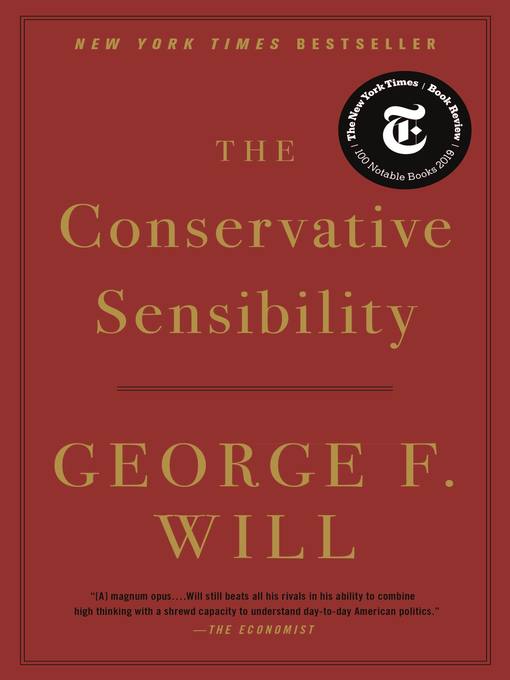
The Conservative Sensibility
کتاب های مرتبط
- اطلاعات
- نقد و بررسی
- دیدگاه کاربران
نقد و بررسی

Pulitzer Prize-winning columnist Will here argues that the Founders' belief in natural rights that antedate government is being challenged by both progressives and elements inside the Republican Party. With a 100,000-copy first printing.
Copyright 1 Library Journal, LLC Used with permission.
April 1, 2019
It’s time to return to the wisdom of the founding fathers, argues this sweeping political manifesto from Washington Post columnist Will (Men at Work). Will grounds his conservative ideology in the doctrine of inalienable rights rooted in unchanging human nature as articulated in the Declaration of Independence and the Constitution, which prescribe limited government that protects life and liberty while leaving the pursuit of happiness up to self-reliant individuals. He contends that America went off-track with the rival ideology of progressivism, promoted by President Woodrow Wilson and his successors, which, Will argues, wants the state to shape human nature and control too many aspects of social and economic well-being; the result he sees is intrusive government, unsustainable health care and pension entitlements, corrupt preferments for elites, ill-advised military adventures, welfare dependency, and disintegrating families. Will centers the book on a rich, wide-ranging discussion of political philosophy written in graceful, aphoristic prose (“The redistributionist state inevitably distributes upward”). In many respects it’s a challenge to today’s populist conservatism as well: Will is pessimistic about the wisdom of voters who embrace populism and enjoins readers to embrace “the disruption ... that accompanies economic and cultural dynamism,” which he sees Trump voters seeking to be shielded from. Both liberals and conservatives will find much to argue with here, but Will offers a formidable, thought-provoking riposte to conventional dogmas. Agent: Robert Barnett, Williams & Connolly.

April 15, 2019
The veteran Washington Post columnist and TV commentator offers a richly documented history of and argument for a wider embrace of conservative political values. "Richly documented" is an understatement. Will (A Nice Little Place on the North Side: Wrigley Field at One Hundred, 2014, etc.) is nothing if not a thorough, dedicated researcher and thinker, but he's often prolix. Many of the historical figures the author references will come as no surprise--e.g., Burke, Moynihan, Madison, Locke--and there are also plenty from the literary world; these include allusions to Twain and Fitzgerald, whose closing sentences from The Great Gatsby provide Will with a metaphor for his principal points. Not much the Pulitzer winner offers here will surprise those who have paid attention to his rhetoric over the decades. His three American heroes remain: Washington, Lincoln, John Marshall. He thinks the U.S. government has grown too big, that it is too interested in providing entitlements (Will is a believer in much more self-reliance than he sees evident today), that schools and universities should do a much more rigorous job of transmitting the Western historical heritage, and that progressives just don't understand how America is supposed to work. However, in one chapter, he may surprise some readers: He declares he is an atheist (though "amiable, low-voltage"), and he spends a few pages reminding us that the founders were not particularly religious and that we must observe the separation of church and state. He praises the civil rights movement but asserts that much of it has gone wrong. Oddly missing are direct references to the current occupant of the White House, though Will does zing many of his predecessors (from both parties but principally Democrats), mostly for their failure to comprehend fully the concept of liberty that fueled the founders. The author's literate, committed voice sometimes disappears in his tangled wood of allusion and quotation.
COPYRIGHT(2019) Kirkus Reviews, ALL RIGHTS RESERVED.

Starred review from April 15, 2019
Russell Kirk's classic work, The Conservative Mind (7th rev. ed., 1986), stresses that conservatism is not an ideology. In the most considerable conservative book since Kirk's, longtime Washington Post columnist Will argues that in the U.S., conservatism is, in fact, eighteenth-century liberalism. The Declaration of Independence states its basic principle, that humans have natural rights to life, liberty, and the pursuit of happiness. The government is made by citizens to protect them in their practice of those rights; it is reactive, not activist. From the beginning, this conservative understanding was answered by another, that government could and should shape citizens for the sake of the collective good; in short, government makes citizens. This latter is the progressive mindset, and progressivism rather than liberalism is Will's name for it on account of the historic Progressive Era that gave rise to Theodore Roosevelt and Woodrow Wilson and inspired such diverse acolytes as FDR, LBJ, Nixon, and Reagan. Conflict between the two conceptions of government courses through U.S. history, as Will demonstrates in philosophically informed chapters on presidential executive power, the judiciary, economics, national culture, education, and foreign policy. The richness and depth of Will's study is astonishing, and perhaps everyone interested in American politics and liberal democracy will find it enthralling. The best of its kind since Kirk? Definitely.HIGH-DEMAND BACKSTORY: Will's fans will seek this out, while the sharp relevancy of his subject will ensure a flurry of high-profile media appearances that will bring in even more readers.(Reprinted with permission of Booklist, copyright 2019, American Library Association.)

























دیدگاه کاربران